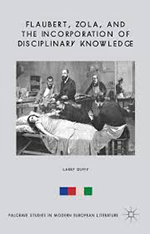Dr Larry Duffy from the Department of French will launch his new book entitled Flaubert, Zola, and the Incorporation of Disciplinary Knowledge (Palgrave Macmillan, 2014) on Thursday 26 February at 5.15pm in CNW9.
At the launch of the book, published as part of the Palgrave Studies in Modern European Literature series edited within the Centre for Modern European Literature, Larry will present a research seminar based on literary and medical discourses of professional struggle and regulation, a key aspect of the book.
This seminar will discuss medical and literary narratives of professional conflicts surrounding disciplinary regulation of the medical and pharmaceutical professions in nineteenth-century France. These narratives – featuring health professionals of varying degrees of professionalism – claim persecution under a regulatory regime set up and presided over by Mathieu Orfila, France’s leading toxicologist. Following discussion of the institutional context for medicine and pharmacy established by the time of the July Monarchy, the paper reads Flaubert’s 1856 novel Madame Bovary alongside Charles-Nicolas Halmagrand’s 1844 work Considérations médico-légales sur l’avortement [Forensic Considerations on Abortion]. The latter text, superficially a medical treatise on a major forensic issue, is a polemical account of its author’s arrest, trial and acquittal on abortion charges, and his subsequent blackballing for charlatanism. Without claiming a direct material link between the two texts, and aiming to transcend the problematic distinction between literary and non-literary discourse, the paper argues that the medical treatise is a document with many ‘literary’ features, and then draws upon striking similarities between its author’s self-pitying and self-promoting rhetoric and that of Flaubert’s pharmacist, Homais, to identify Madame Bovary as a documentary articulation of issues surrounding the disciplinary regulation of medicine and pharmacy.
The book launch is open to all and will include complimentary wine. Full details of the event are available at www.kent.ac.uk/secl/events

